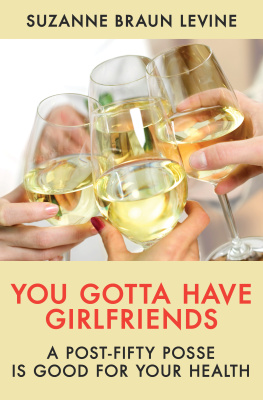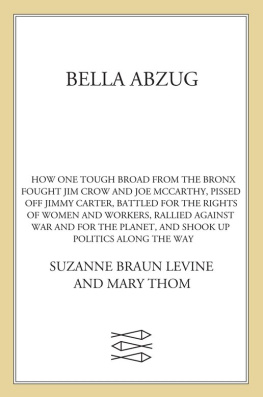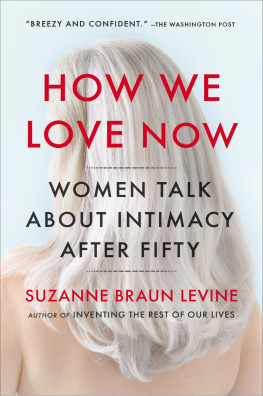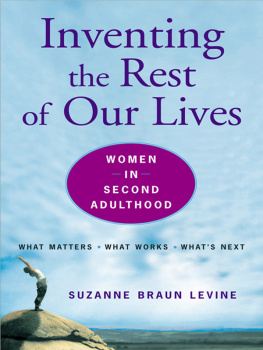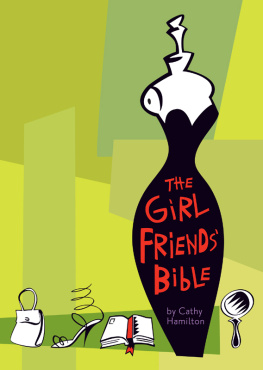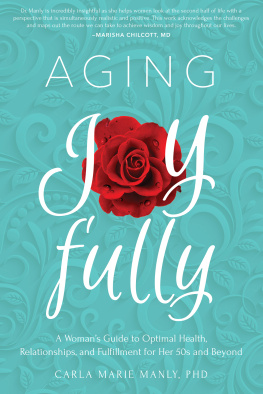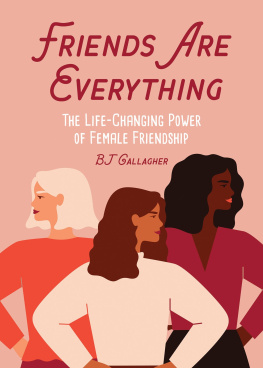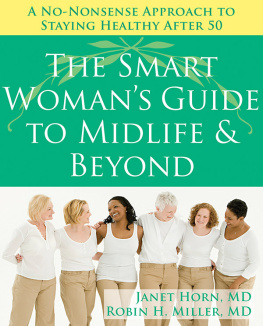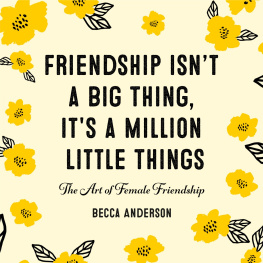
YOU GOTTA HAVE GIRLFRIENDS
A Post-Fifty Posse Is Good for Your Health
SUZANNE BRAUN LEVINE

Authors note:
I interviewed and heard from literally hundreds of women (and some men) as I was writing this book. Some were happy to have their full names used, but others were more comfortable with a pseudonym, so I gave them names that I thought reflected their personalities. I also made up names for those online correspondents who posted comments to my blogs under display names such as C mon and noaxe397 because I didnt see any reason to make a distinction between them and other on-line or in-person voices. When I write about my circle of trust I use their first names. I want to thank them all for helping me understand and describe the very special connection among girlfriends.
CHAPTER 1:
YOU GOTTA HAVE GIRLFRIENDS
Time passes.
Life happens. Distance separates.
Children grow up.
Jobs come and go.
Love waxes and wanes.
Men dont do what theyre supposed to do.
Hearts break.
Parents die.
Colleagues forget favors.
Careers end.
But
Sisters are there, no matter how much time and how many miles are between you.
A girlfriend is never farther away than needing her can reach.
Internet circular
THE BEST THING A MAN can do for his health is to be married to a woman. One of the best things a woman can do for her health is to nurture her relationships with her girlfriends, especially after the age of fifty. The longer we live, the more important our friends become. We call them our chosen family and in times of need they are the most likely to be at the door, on the phone, or in the waiting room. In other words, the post-fifty version of an apple a day is nurture your friendships.
Not only do our girlfriends keep us physically healthy, but their support can also make us well when we are sick. A study of breast cancer patients by researchers at Ohio State Universitys Comprehensive Cancer Center found that those who were in a supervised support group were 56 percent less likely to die than those who were going it alone. In fact, the stress-reducing influence of their company is thought to contribute to women's longer life expectancy than men. I had two separate conversations with friends today about how they tend to hold things in, sometimes until they experience physical symptoms, one woman told me. One has panic attacks, the other had shingles, which she attributes to stress. Both are hesitant to express their emotional pain to their husbandsthey just dont seem to understand. But, she adds, both reiterated how much they need their girlfriends.
Friends are just as vital to our psychological and spiritual well-being. They give us courage, confidence, and understanding; we know that no matter what happens as we age, we are not alone. They give us love, patience, acceptance, and a healthy dose of comic relief for the accumulating absurdities of life. And we empower each other to achieve the well-being of accomplishment beyond the years of past generations. All in all, such cherished friends are a blessing; they make life matter when it counts.
Our mothers generation wouldnt understand this notion of friends helping friends achieve new levels of accomplishment and vitality beyond the sell-by date of menopause; their friendships remained relatively static as their circles aged together. Our own friendships, on the other hand, shift during different life stages. They may not have been as important to us earlier in our lives as they will become now. Back in our thirties and forties, we were frantically balancing the multiple demands on our days, and friends were just one ingredient in a swirling mix. Many of us neglected some meaningful friendships for those that developed out of common interests (parents whose children were friends with your kids) or shared space (workplace colleagues). In our fifties, we open a new chapter in our lives, and we cant take friends for granted any more. Without a circle of trust, we will have a very hard time turning the page.
We are entering a challenging, promisingand unprecedentedstage of life Gail Sheehy, in her book Passages, has called Second Adulthood. The twenty-plus years after fifty are a statistical gift to our generation, bestowed by the good health, accumulated personal authority, and self-awareness of our first adulthood. An open field of dreams lies between adulthood and old age, where we move from a life in which we have fulfilled many roleschild, student, mother, employee, wifeto one where we are able to write our own scripts. For many of us, it is the most exciting, optimistic, and fulfilling stage of our lives.
I often hear from women who are amazed to find that they are happier now than ever beforethat despite sagging boobs and drifting memories, this is the best time of their lives. We feel more confident, more open to new experiences, more appreciative of good times, more thoughtful and self-aware. At the same time, things dont get to us the way they used to; we have literally mellowed with time and simply dont sweat the small stuff. Recent studies by Laura Carstenson at Stanford and others have found that people over age fifty are very happy, happier, according to the researchers, than those respondents in their twenties and thirties. That makes sense when you think about it. We are better able to roll with the punches and many of the conflicting demands on us have receded.
To get there, though, we must pass through a period of upheaval as confusing and extended as adolescence. The two have a lot in common: raging hormones, self-doubt, recklessness, tumultuous relationships, and wrestling with the question of what we will do with the rest of our lives. No matter how independent and resourceful we are, meeting this challenge successfully requires teamwork. And courage. Many think of courage as a solitary journey, write Deborah Collins Stephens, Jackie Speier, Michaelene Cristini Risley, and Jan Yanehiro, the friends and co-authors of This Is Not the Life I Ordered. We believe the journey of courage is best walked with women friends who literally and figuratively en-courage us.
The journey takes us through change and doubt, and the destination is not clear. It is easy to get stuck and hard to forge ahead. That is where our encouraging friends come in. As Ellen Goodman and Patricia OBrien point out in their book, I Know Just What You Mean: There are times when a friend provides more than the warm soup of empathy. She becomes a catalyst for change. Over a long life, full of disruptions, stops, and start-ups, friends can be the collaborators, the instigators who make change possible. They are often the ones who urge us to take a leap, who jump with us or help us scramble back up the other side. When it gets good, Second Adulthood is about taking leaps, so a loving nudge is essentialespecially since the men we know are often heading in the opposite direction, looking to scale back and settle in.
By the time we reach fifty, Eileen Williams, founder of the website The Feisty Side of Fifty points out, we know a thing or two about the changes that life can bring. Weve lost loved ones to death and gone through the breaking up of relationships. Weve endured injured pride, damaged self-esteem, rejections, and crushing disappointments. And we have gone through menopause. Surviving hard times has also taught us a thing or two about what makes the difference between triumph and defeat. I havent interviewed a single woman about the ups and downs of her recent life who hasnt at some point told me a story that ended with a grateful I couldnt have gotten through it without my girlfriends.

